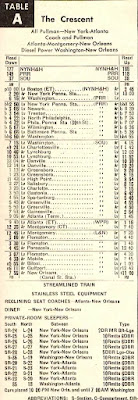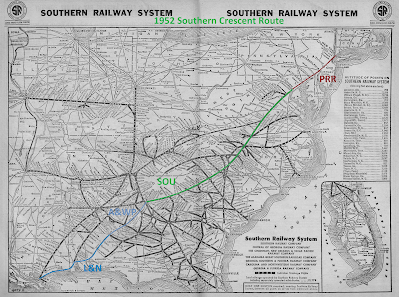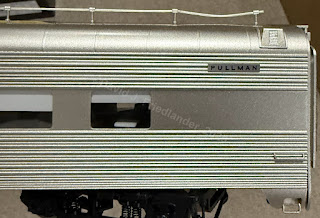While in Golden Gate Depot's backlog since the beginning of 2021, the Southern Railway 1950's Era Crescent finally hit enough reservations to be designed and built. The initial release was in March of 2025 and a quick second follow-on reservation slated to arrive in Fall 2025.
More on the train itself.
The Crescent originally was a pool of cars from several railroads. The train itself ran from New York City (Penn Station) all the way down to New Orleans. The train itself would have been behind GG1's from Penn Station down to Washington, DC, when they switch out to SOU power. Early on, power would also potentially switch to the other railroads involved in this pooled train. Over time, SOU power would have evolved or been a mix of E7's, E8's, and FP7's.
The railroads involved in the early pooled Crescent were Southern Railway, Louisville & Nashville Railroad, Western Railway of Alabama, Atlanta & West Point Railroad, and the Pennsylvania Railroad. Some Pullman sleepers went the entire route, while some were pulled off and replaced with coaches in Atlanta. Below are a timetable and route map showing this train in 1952. The exact route and the cars that were on the train evolved over time, but New York-New Orleans exists til this day with Amtrak.
1952 Crescent Timetable
1952 Crescent Route Map
I suggested to Golden Gate Depot (GGD) that they make a purely Southern train, with add-on cars for all other road names that had cars in the consist. It turns out this is how the offering unfolded. Most of the orders to the car builders included identical cars for both the New Royal Palm and the Crescent, so it only made sense to make GGD's project financially possible by adding other road names that were a part of these builder lots. Hopefully they made other modelers happy. I have no idea what the final tallies were per road and car number.
Due to the economics, GGD usually starts with a 6 to 8-car main consist with add-on cars. Several customers helped him decide on the main 8-car consist. I helped choose cars that would have been seen on an all lightweight Crescent, though I did also suggest that a 14/4 sleeper get included, as this was likely the only chance to get one of these variants made RTR and at this level of quality.
Regardless of the 14/4 sleeper suggestion, there are some other historical notes for this train. The re-equipped Crescent was officially inaugurated in March 1950, and below are three permutations that should be mentioned:
- 5-Buf-Lng-Obs Royal Arch was renamed Luther Calvin Norris almost right away - in November 1950. Many photos of the 5-Buf-Lng-Obs car were taken early, so they show the Royal Arch nameplate, but those photos were all taken during the first 9 months of its life.
- I'm not sure if both nameplates were made, but I had suggested both names for the SOU and WofA's OBS cars be in the box. The OBS car I received is named Royal Arch.
- For WofA's OBS, it was named Royal Palace and then renamed Charles A. Wickersham in 9/1952.
- The 5-Buf-Lng-Obs cars only lasted 6 years in service and were converted to 11DBR sleepers, which appeared in 9/1958. As far as I know, no poll was taken, so its unknown if the majority of purchasers model this train before or after 1958, but the decision was to make the OBS. I model after this time, so mine will remain in its box forever or until I decide to sell it.
- Full-width diaphragms were removed within 1-2 years of original service. The decision was to make the cars without the full-width diaphragms. I believe the tooling was already configured this way, but this should make it easier to operate these cars around tighter curves and apply to a wider era of modeling.
This was the list that I compiled from several sources and provided to Golden Gate Depot.
This is GGD's ad for the second run of cars.
Here is the last pricelist, that I believe incorporates a small percentage for any tariffs. It also signifies what road name/car options were available. I do not have a list of every car name/road number that was done. Some of them only had one option though.
Receipt and inspection of the 8-car set.
After initial inspection and some weathering of the roof vents, wheel faces, and painting any exposed red wires black, below is what improvements I will look to tackle to bring these cars in line with my modeling era and fidelity. Work will be delayed until my additional sleepers and coaches arrive in Fall:
- Modernize 1702 for 1960's - Plate Windows and Fluting; Remove Mail Catchers
- Fix the Bag-Dorm numbers; should be on carbody, not fluting.
- Paint screws with Krylon paint
- Fix baggage-mail steps, as its missing a rung (the rung was in the CAD drawings...)
- Paint interiors in prototypical colors
- Add more passengers
- Consider redoing window shades where they may be too aggressively pulled down.
- Consider redoing the Budd Vents
- Consider adding brake levers
- Light weathering based on late 1960's photos
Some behind the scenes notes as I assisted with CAD and artwork review. I do not make the changes, I only study photos and the artwork and point out inaccuracies. I'm glad most of what I saw was fixed. Sometimes inaccuracies are not fixed due to prohibitive tooling cost, complexity, or factory mistakes.
CAD:
- I helped correct roof vent types and locations to match prototype. The vents over the vestibules are not an exact match, but close enough.
- I helped correct several missing grab irons as well as correct the location of some of them.
- I helped correct the Budd Vent, though I still think the casting used doesn't have enough depth to it.
- I helped correct the ends used on the Budd cars as they going to use Pullman ends.
- Tooling limitations prevented some fluting that shouldn't exist, that exists on the Bag-Mail and OBS cars.
- Tooling limitations prevented roof line rivets from being added, but I also found and helped get other erroneous car body rivets removed.
- The raised panels that should be on the mail car next to where the catchers would hit the car were noted, but did not make it onto the final product.
- I helped correct some skirting issues, but some skirting that should exist on the Bag-Mail did not make it on the final cars, I'm assuming that's due to tooling limitations.
- If you wanna get into minutia, the handrails should have inward curvatures to them as well as squared doors, but none of that was modeled due to complexity and tooling limitations. Some steps on the ACF cars may not be accurate due to tooling reuse.
- Bag-Mail interior isn't accurate.
- Bag-Mail door handles not depicted.
- I did point out some Dining Car kitchen door details that did not make it onto the production run.
- The bar loading doors were missing on the OBS and Buffet car CAD files. I helped get this corrected on the production run.
- I helped correct the location of the buffet car antenna location.
Artwork:
- The most glaring issue I saw was that trucks and underbody were going to be Silver. They are all accurately painted black in the production run.
- PULLMAN was missing off of most of the corner plates.
- I believe the mail catchers should be black and not silver.
- The original FEC OBS artwork had the modern FEC logo added to it. I pointed it out and I hope it was removed on the production run.
- I did note that the length of the name plates should vary based on the car names - basically only as long as the lettering required. I am assuming due to complexity and risk of mistakes, every car nameplate looks to be the same length.
- Some SOU cars had SOU emblems added to them, which was not accurate for 1950's. However, 1970's modelers can add those themselves and/or paint the roofs black easily.
- I helped correct the sizing and spacing of SOUTHERN and road numbers on some of the cars.
- The placement of the car nameplate and roadname nameplate were off. Some of them were fixed, some of them were not.
- The factory often in their first draft of artwork, uses photos of cars that sometimes are of modern day configurations of these historic cars. For example, one of the Buf-Lng cars is or was at some point WATX 2351, so the artwork had reporting marks on them by mistake. This was caught and was removed on the production run.
- I had also caught a fluting issue on the Budd cars. CAD was correct, but the artwork wasn't prepared correctly for all of the fluting.
- I pointed out that the Bag-Dorm car number should on the carbody and not top of the fluting, but unfortunately, that wasn't fixed in the production run.
Below is a photo essay of the main set minus the observation car as I unboxed them, inspected them, installed couplers, and lightly weathered the wheel faces and roof vents.
Unboxing - These 8 boxes all fit into one cardboard shipper.
Parts Baggies - Customer must attach any necessary steps.
Underbody Details
10-6 sleeper underbody cluster:
baggage-mail underbody cluster:
Trucks
Coupler Installation Testing (Ended up using 805's on the innermost set of holes)
Defects found during inspection - I found some minor issues with my set. Some damage on a numberboard. The antenna was bent in transit, but was carefully re-bent straight. The interior in one of cars was clearly not wavy. Taking off the end, it was not inserted correctly into the shell.
Paint Matching - I found a paint that matches these cars that can be used for screw heads and other modifications.
Vent Weathering - I weathered all vents with black washes to add depth and darken where there should be vents rather than flat surfaces.
Each car has a nice weight to it, not only from the Aluminum body, but from the full interior. Some cars felt heavier than others, so I decided to weigh them. They vary between 2 and 3lbs. While the trucks they ride on are not equalized, they do contain ball bearings and roll very easily.
Pullman 10-6 Sleepers
Pullman 14-4 Sleepers
ACF Bag-Dorm

ACF Bag-Mail
Budd Dining Car
Budd Coach
Pullman Lounge Car
Thanks for looking. Don't forget, you can click into any image and see the full size.
Overall, I'm glad this train hit enough momentum to get done. Regardless of a few flaws and high cost, the train mostly faithfully follows the prototype and is far better than most anything most of us can scratchbuild at this level of detail, straightness, and consistent finish. Thanks to Scott and his factory that can build such well-built cars. I had his first attempt, the NYC ESE, and these have come a very long way. This set gives me enough cars to model a handful of late 60's passenger trains. I also have one MAC Shops lightweight car of a different prototype and it will be many hours of work to get it anywhere close to the level of detail of these RTR cars.
I see quite a few individuals complain and balk at the high price GGD asks for their passenger cars. There's a lot of work that goes into these cars and costs continue to rise as demand continues to stall or soften. Rapido is the gold standard of passenger cars? Sure, but HO has a much larger economies of scale and some uber-dedicated hobbyists running their company, that is making things for his own layout. Some complaints originate from those who never could afford or would spend that kind of money on a hobby. I don't get why they even chime in with this pessimistic viewpoint. It makes them look petty or upset that life didn't deal them the best cards. Social media hasn't helped with that with all of the look-at-me and my latest purchase types. For those that are on the edge and are trying to understand what more do they get from a more premium product, they should consider the following:
- Does my budget allow me to even consider these cars?
- Do I desire a high-end, high-fidelity passenger train?
- Has GGD made or is making a passenger train that I really need?
- Do I have a trackplan that realistically allows for 21" cars?
Personally, I strive for high-detail and quality over quantity. Before this purchase, I owned maybe 4-5 passenger cars that still need to modified and repainted into SOU prototype. I shifted my budget to ensure I could purchase some key, expensive items such as this passenger train. I determined I really only need one or two passenger trains on my layout, so its worth the one-time splurge to get the fidelity of cars I desire that are specific to my modeling interests at the sacrifice of other purchases. I could have 2R'ed and re-lettered generic Lionel or K-line 21" cars, but I desire higher levels of accuracy and detail.
To those who say just build it yourself. I could, but with this level of detail, the raw parts would most likely be half the price of the RTR model and more importantly, hundreds of hours of my life spread across design, procurement, and assembly. Time is limited. I think the real bargain here is that I just saved myself hundreds of hours from building equivalently detailed and finished cars.












































































Thanks for this excellent review. I bought the Milwaukee Olympian set a couple years ago and am very happy with the product. What you say about fidelity, cost, and saving of time applies equally to me.
ReplyDelete